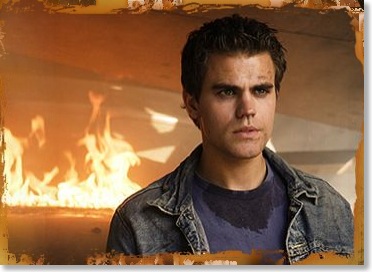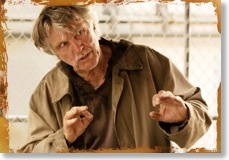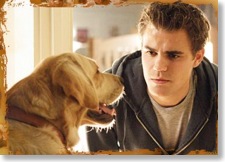Sympathy for the Devil? ABC Family's "The Fallen"
(Genesis 6:4, HCSB)

Out of curiosity, I watched a repeat of the premier of The Fallen tonight on the ABC Family Channel. Knowing that they were basing the show's mythology off the rather obscure verses at the beginning of Genesis 6, I admit I was mildly intrigued. Here, with multiple typos left as they are other than my note of them (= sic), is ABC Family's synopsis from the website for The Fallen:
All Aaron ever wanted was a normal life. Newly adopted by Lori and Tom Corbett, Aaron believes that he finally has a chance to be like everyone else. Hes [sic] good at school. Hes [sic] on the wrestling team, and Vilma, the preiitest girl in school, knows hes [sic] alive. But on his 18th birthday everything changes.
Suddenly, Aaron has unusual powers and a strange dream haunts him. A homeless man name [sic] Ezekiel, who claims to be a fallen angel, tells Aaron that he is a Nephilim, or half-angel/half-human. Zeke warns Aaron that the Powers, an army of killer angels, are are coming to destroy him. If Zeke is right, then Aaron has been swept into a centuries-old battle between the Powers and the Fallen, a group of angels banished from heaven. Aaron shakes off Zekes [sic] ravings but startling events lead him to think that maybe Zeke could be right. There is a mysterious man in a black [sic; word is missing, possibly "coat"?] following him. His newfound abilities seem to be getting stronger, and he sees signs in the most unlikely places. When Aaron comes face to face with his fate, he can no longer deny the truth.
Caught in a celestial war waged on Earth and haunted by an ancient prophesy [sic], Aaron is forced to make a difficult choice. His chances of being normal are gone, but is he The One?
There you have it, Frank Peretti meets Highlander. The two-hour premier (there are plans for six more hours in 2007) was fairly light popcorn stuff. It felt like a fantasy version of a coming-of-age story on an After-School Special of years gone by. I guess that's to be expected since the movie was based on the young adult novel of the same name by Tom Sniegoski. I have no idea how close the movie was to Sniegoski's original story having not read it, but I wasn't overly impressed with the cinematic interpretation.
The story itself felt very contrived and predictable. When Aaron's dog gets hit by a car right before a commercial break, it was pretty evident that this would be a reason to highlight Aaron's developing "angel powers." The high school drama is fairly typical. Aaron is the new guy at school and suddenly the most popular girl takes notice of him. He clashes with the jocks on the wrestling team of which he is a member--perhaps as an allusion to Jacob wrestling the angel in Gen 32?


The mythology (I would really hate to call it theology) is one of the more bizarre aspects of The Fallen. Satan is never directly referenced except as "the powerful angel who led a rebellion in heaven." The story takes an extreme mythological interpretation of Genesis 6:1-4, to say that fallen angels have procreated with humans resulting in half angels/half human hybrids called the Nephilim. A hit squad of angels called the Powers has been commissioned by God to eliminate any of these half-breeds they can find. If the Angels have to torture and even kill normal humans in order to find the Nephilim, well, these are merely collateral damage. The battle near the end with what looked like flaming light sabres was quite laughable.
Thus you have a story that makes the angelic hosts look like the bad guys and sympathy is given to the fallen angels and especially their half human offspring who are killed in spite of their pleas for mercy. To make things even more bizarre, it seems there is an ancient prophecy (not a biblical prophecy, mind you) that says a Nephilim will arise who will stand in the gap between God and the fallen angels offering them redemption. Of course, Aaron (appropriate named after Moses' brother, the first high priest of Israel) turns out to be this prophesied Nephilim, also known as--shades of Highlander and the Matrix trilogy--The One.
Skerritt's character also has to deliver a politically correct line equating the God of the Bible with Allah, Shiva, and any other concept of God. Never mind the irreconcilable differences between these theologies. If there was any question as to whether the writers have a respectful view toward the Judeo-Christian tradition, this clearly demonstrates that they do not.
The Bible, of course, makes no mention of redemption regarding fallen angels. Perhaps their sin was even more egregious because of their intimate knowledge--even greater than ours--of the one true God. But that also makes us ask whether a mythological interpretation of Genesis 6:1-4 is the best one. Although the interpretation regarding relations between angels and humans is very old and has had many notable proponents, it seems to be contrary to other statements in the Bible including Jesus' remarks about angels: "For when they rise from the dead, they neither marry nor are given in marriage but are like angels in heaven" (Mark 12:25, HCSB). Plus the idea of angelic/human coupling seems a bit repugnant to me under any condition.
Another line of interpretation would identify the sons of God with "the godly line of Cain" while the daughters of men are said to be "the sinful line of Cain." This seems unsatisfying as well. A better solution is offered by Walter Kaiser in Hard Sayings of the Bible:
The preferable interpretation of this passage is the sociologically mixed view. "Sons of God" is an early, but typical, reference to the titularies for kings, nobles and aristocrats in the ancient Near Eastern setting. These power-hungry despots not only lusted after power but also were powerfully driven to become "men of a name" (or "men of renown"-- Gen 6:4).
In their thirst for recognition and reputation, they despotically usurped control of the states they governed as if they were accountable to no one but themselves. Thus they perverted the whole concept of the state and the provision that God had made for some immediate amelioration of earth’s injustices and inequities (Gen 6:5-6; see also Gen 10:8-12). They also became polygamous, taking and marrying "any of [the women] they chose" (Gen 6:2).
What evidence can be produced for the correctness of this view? There are five lines of evidence. (1) The ancient Aramaic Targums render "sons of God" as "sons of nobles" (Targums of Onkelos), and the Greek translation of Symmachus reads "the sons of the kings or lords." (2) The word gods (Hebrew elōhîm) is used in Scripture for men who served as magistrates or judges ("Then his master must take him before the judges [elōhîm]," Ex 21:6; see also Ex 22:8; Ps 82:1, 6). (3) Structurally, the account of the Cainite Lamech (Gen 4:19–24) and that of the "sons of God" in Genesis 6:1-4 are very much alike. In each there is the taking of wives, the bearing of children and the dynastic exploits. The former passage ends with a boast of judgment by Lamech, and the other ends with God’s decree of judgment. Lamech practiced bigamy (Gen 4:19), and he enforced his policies by using tyranny. The portraits are parallel and depict states of tyranny, corruption and polygamy. (4) Near Eastern discoveries have validated the pagan use of all sorts of gods' and goddesses' names in order to give more clout and prestige to the governments of Egypt and Mesopotamia--hence the title "sons of God."
The fifth and final line of evidence concerns the nep̄lîm/gibbôrîm of Genesis 6:4. The word nep̄lîm occurs only here and in Numbers 13:33, where it refers to the Anakim, who were people of great stature. The root meaning of the word nep̄lîm is "to fall." However in Genesis 6:4 the nep̄lîm are associated with the term gibbôrîm. The word gibbôrîm comes from gibbôrîm, meaning "a mighty man of valor, strength, wealth or power." Nimrod, in Genesis 10:8, was such a gibbôrîm. He also was clearly a king in the land of Shinar. Hence the meaning of nep̄lîm/gibbôrîm is not “giants,” but something more like "princes," "aristocrats" or "great men."
Genesis 6:1–4, therefore, is best understood as depicting ambitious, despotic and autocratic rulers seizing both women and power in an attempt to gain all the authority and notoriety they could from those within their reach. Their progeny were, not surprisingly, adversely affected, and so it was that God was grieved over the increased wickedness on planet Earth. Every inclination of the hearts and thoughts of humanity was evil. Thus the flood had to come to judge humankind for the perversion of authority, the state, justice and human sexuality.
This seems to be the most sensible interpretation of Gen 6:1-4 to me, but your mileage may vary.
As an aside, I must ask what happened to the purpose of the ABC Family channel? ABC bought the network from Pat Robertson's media company when it was originally known as the CBN Family Channel. I'm no fan of Robertson or CBN, but I'll admit there was some occasional good programming when it was under CBN control. Much of The Fallen seemed quite unsuitable for primetime family viewing as it was rated TV-14 for language and violence. The language, although tamer than what you would find in a rated-R movie, seemed unnecessary and even inappropriate at times. Again, it makes me question exactly how "family"-oriented ABC Family actually is.









